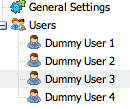ExtJS 4:具有静态和动态加载数据的 TreeStore?
我正在制作一个如下所示的 TreePanel:

目前我已将其“模拟”下面的代码:
treePanel.setRootNode({
text: 'Root',
expanded: true,
children: [
{
text: 'General Settings',
icon: kpc.cfg.baseUrl.img+'/icon_gears-bluegreen.gif',
leaf: true
},
{
text: 'Users',
icon: kpc.cfg.baseUrl.img+'/icon_users-16x16.gif',
expanded: true,
children: [
{
text: 'Dummy User 1',
icon: kpc.cfg.baseUrl.img+'/icon_user-suit.gif',
leaf: true
},
{
text: 'Dummy User 2',
icon: kpc.cfg.baseUrl.img+'/icon_user-suit.gif',
leaf: true
},
{
text: 'Dummy User 3',
icon: kpc.cfg.baseUrl.img+'/icon_user-suit.gif',
leaf: true
},
{
text: 'Dummy User 4',
icon: kpc.cfg.baseUrl.img+'/icon_user-suit.gif',
leaf: true
}
]
}
]
});
如何动态加载单个用户(即通过商店)? 换句话说,如何制作一个混合了静态和动态加载项目的 TreeStore?
谢谢!
I'm making a TreePanel that looks like this:

At the moment I have it "mocked up" with the following code:
treePanel.setRootNode({
text: 'Root',
expanded: true,
children: [
{
text: 'General Settings',
icon: kpc.cfg.baseUrl.img+'/icon_gears-bluegreen.gif',
leaf: true
},
{
text: 'Users',
icon: kpc.cfg.baseUrl.img+'/icon_users-16x16.gif',
expanded: true,
children: [
{
text: 'Dummy User 1',
icon: kpc.cfg.baseUrl.img+'/icon_user-suit.gif',
leaf: true
},
{
text: 'Dummy User 2',
icon: kpc.cfg.baseUrl.img+'/icon_user-suit.gif',
leaf: true
},
{
text: 'Dummy User 3',
icon: kpc.cfg.baseUrl.img+'/icon_user-suit.gif',
leaf: true
},
{
text: 'Dummy User 4',
icon: kpc.cfg.baseUrl.img+'/icon_user-suit.gif',
leaf: true
}
]
}
]
});
How can I load the individual users dynamically (i.e., via a store)? In other words, how do I make a TreeStore that is a mixture of both static and dynamically-loaded items?
Thanks!
如果你对这篇内容有疑问,欢迎到本站社区发帖提问 参与讨论,获取更多帮助,或者扫码二维码加入 Web 技术交流群。

绑定邮箱获取回复消息
由于您还没有绑定你的真实邮箱,如果其他用户或者作者回复了您的评论,将不能在第一时间通知您!

发布评论
评论(5)
最适合我的解决方案是:
我写了一个小教程,其中包括一个可运行的演示 此处(以防有人想要更详细的答案),但在较高级别上,代码如下所示:
The solution that worked best for me was to:
I wrote up a little tutorial that includes a runnable demo here (in case anyone wants a more detailed answer), but at a high level the code looks like this:
我相信
node参数会对您有所帮助。设置 autoLoad: false,然后利用实际树面板的 beforeerender 事件。在事件内部调用商店的加载函数,并向其传递一个节点。文档指出,如果从load()调用中省略它,它将默认为根节点。看来您可以将设置保留在根节点中,然后通过调用 load 并将其传递给子节点,您就可以仅更新用户。请参阅:http:// /docs.sencha.com/ext-js/4-0/#!/api/Ext.data.TreeStore-method-load 供参考。请注意,此加载函数与
Ext.data.Store中的不同(Ext.data.TreeStore不是从Ext.data.Store继承的)代码>)。我还没有机会对此进行测试,但看起来很有希望。
I believe the
nodeparameter will help you. SetautoLoad: false, then leverage thebeforerenderevent of the actual tree panel. Inside the event call the store's load function, and pass it anode. The docs state that if this is ommited from theload()call, it will default to the root node. It would appear that you could leave your settings in the root node and then by calling load and passing it a child node, you'd be able to update just the users.Please see: http://docs.sencha.com/ext-js/4-0/#!/api/Ext.data.TreeStore-method-load for reference. Note that this load function is not the same as in
Ext.data.Store(Ext.data.TreeStoredoes not inherit fromExt.data.Store).I have not had the opportunity to test this, but it seems promising.
我有一个非常相似的问题,虽然我还没有让它完全按照我想要的方式工作,但它基本上可以工作。我有
autoLoad: false并添加了此事件处理程序:根的 3 个直接子级是静态的,然后代理在我展开它们时发出填充它们的请求(传递适当的 id)。
我还必须禁止根节点在 store 上加载侦听器:
希望这会有所帮助。看来应该有更好的办法!?!
I have a very similar problem, and while I haven't gotten it to work completely like I want it to, it mostly works. I have
autoLoad: falseand added this event handler:The 3 immediate children of the root are static, then the proxy makes a request to populate them when I expand them (passing the appropriate id).
I also had to suppress the root node from loading with a listener on the store:
Hope this helps. It seems like there should be a better way!?!
这是我将普通数据转换为treeStore数据的函数,您可以使用它。这样,您就不再需要treeStore:
Records:记录数组。
文本:项目名称(从记录中获取)
Children:孩子的名字(默认为“children”)
Here is my function to convert normal data to treeStore data, you can use that. By that way, you don't need treeStore anymore:
Records: array of record.
Text: name of item (get from record)
Children: name of children (default is 'children')
我使用阅读器以我认为优雅的方式实现了这种效果。请注意,这是一个扁平商店,与树商店看起来可能有点不同。这个概念应该翻译。
I used a reader to achieve this effect in what I feel to be an elegant fashion. Mind you this is with a flat store and may look a little different with a tree store. The concept should translate.